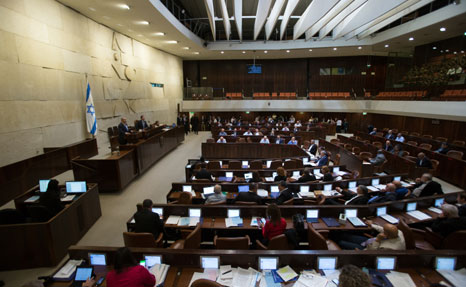The Knesset is not a Sanctuary
This claim was first put forth in a letter from the Knesset’s legal adviser, Eyal Yinon, to the speaker of the Knesset with regard to the situation of MK Haim Katz.

Knesset | Flash 90
In the last few days, the media have been spreading the claim that as long as there is no government and if we are going to hold new elections, Knesset members cannot be put on trial. The rationale for this assertion is that the Knesset House Committee, which is charged with ruling on requests for immunity, has not been set up, and if the committee doesn’t exist, we simply have to wait until it does – which means until a government is formed after the next elections.
This claim was first put forth in a letter from the Knesset’s legal adviser, Eyal Yinon, to the speaker of the Knesset with regard to the situation of MK Haim Katz, who was indicted after a hearing on his case. Several days before the September elections, Katz requested the Knesset to grant him immunity. Yinon wrote that the “Arrangements Committee” (which operates in the Knesset until a new government is formed) is not empowered to consider MKs’ requests for immunity. In addition, because the elections were only a few days off, convening a special committee to consider such a request was both inappropriate and would not be useful. Yinon also hinted that in any case, the attorney-general would not file the formal indictment before the Knesset held deliberations on the request for immunity.
This letter has become the basis for the assertion that the Knesset House Committee cannot be established during the term of a caretaker government, and consequently, that Knesset members cannot be put on trial in the interim. This would mean that new elections would set back the legal calendar by another six months or so.
Clearly, this legal interpretation is insane. It implies that as long as there is no coalition in place, the Knesset can serve as a sanctuary, and none of its members, including the prime minister, can be tried in a court of law. This outcome is unacceptable from the perspective of the rule of law and equality before the law.
Furthermore, clearly this is not what is implied by Yinon’s letter, which referred to a specific and unusual situation just a few days before the elections. In a different situation, when there is ample time before elections, there is no legal impediment to setting up and convening the Knesset House Committee, even if only to deal with requests for immunity.
It follows that if the Knesset wishes, it can do precisely that. In practice, not only can it convene the House Committee, it is required to do so. According to the law, when an indictment is sent to the MK and to the Knesset speaker, and after the MK requests immunity, the request is to be heard by the House Committee “with maximum urgency.” It follows that the Knesset is obligated to set up the committee; if it does not, it is obstructing the law.
But what happens if the Knesset declines to set up a committee? In my opinion, after a certain interim period, when the attorney-general concludes that there is no rational basis for the failure to set up the committee, he has the authority to submit the indictment to the courts. Parliamentary immunity is not the default situation, but rather a means to allow the Knesset to defend its members against persecution by the executive branch.
If the Knesset refuses to take action in order to do so, and especially if the MK requesting immunity has a hand in the Knesset’s failure to convene the committee, the attorney-general may, at his discretion, decide whether or not to file the indictment. Any other interpretation of the law would enable MKs to abuse the immunity process as a stay of proceedings, and this is not why it exists. Furthermore, it would provide an incentive for MKs suspected of criminal wrongdoing to attempt to block the formation of a government and push for new elections, if only to gain more time.
The Knesset’s legal adviser and the attorney-general should make MKs and the public fully cognizant of what they deem to be the correct interpretation of the statute on hearings on MKs’ immunity during the term of a caretaker government.
The article was published in the Jerusalem Post.
